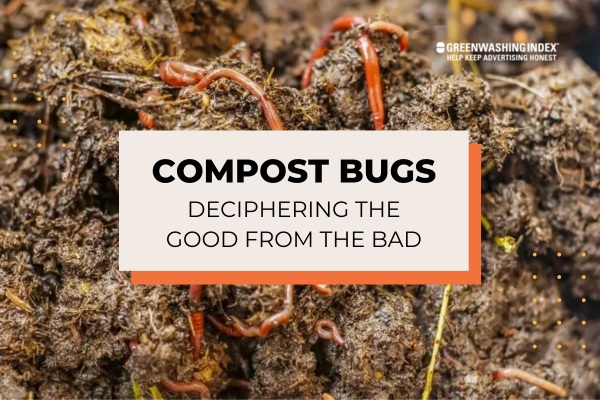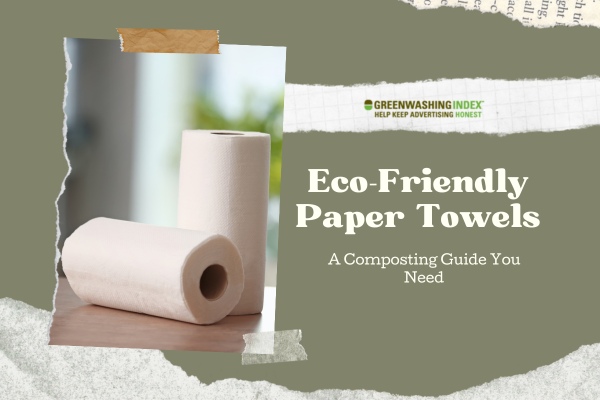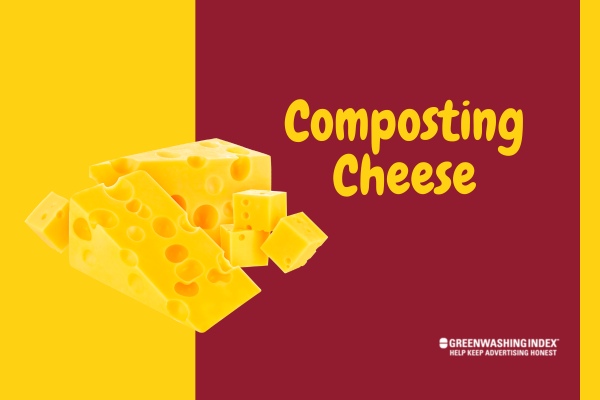Within every backyard compost pile, an unseen world teems with life. Compost bugs, often neglected or misunderstood, play crucial roles in our sustainable gardening efforts.
Understanding their individual contributions and potential havoc brings us a step closer to achieving organic decomposition and soil health of unprecedented vigor. Let’s get acquainted with this fascinating microcosm bubbling right under our noses.
Compost Bugs are essentially the unsung heroes of our compost heaps. Responsible for organic decomposition and improvement of soil health, these beneficial insects convert waste into nutrient-rich food for plants.
In contrast, some other bugs could be more detrimental than helpful to our composting process by spreading diseases or overwhelming beneficial populations.
Understanding The Ecosystem of Compost Bugs
Almost every garden enthusiast has stumbled across strange-looking critters while turning over their compost heap. Often it’s a pivotal moment filled with curiosity about these bugs.
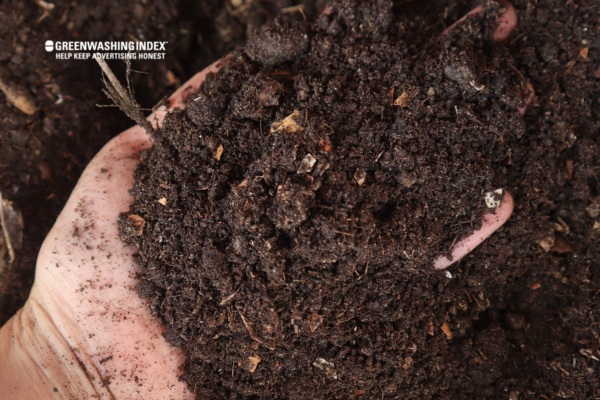
Are they really necessary for my compost? This is where unraveling the ecosystem of compost bugs becomes essential.
What are the Compost Bugs, and Why Do We Need Them?
Compost bugs, as their moniker suggests, inhabit and feast on your compost pile. Here’s a fun fact—you’d find almost all of them hard at work, even in the freshest and most balanced heaps.
Let me shed light on why these guests frequent your compost:
- Organic Decomposition: These little critters play an integral part in breaking down plant matter into usable organic matter that enhances soil health.
- Nutrient Cycle: By digesting waste, they help recycle nutrients back into the soil, thereby promoting sustainable gardening practices.
- Microbial Ecology: The presence of certain bugs aids in maintaining robust microbial communities, ensuring organic decomposition occurs efficiently and effectively.
But wait! It isn’t all roses with compost bugs. A careful balance needs to be established because not all livestock present is beneficial to your pile or garden. Some might munch on crops, while others could trigger infestations or diseases if left unchecked.
Hence, it’s crucial to understand which insects you should welcome with open arms versus those you need to keep an eye out for!
Understanding the ecosystem of compost bugs gives us insights into their role as diligent decomposer organisms working round-the-clock behind the scenes to maintain a healthy balance in our gardens. So next time you see a bug scuttling across your heap, remember there’s more than meets the eye!
The Good Guys: Beneficial Compost Bugs
Digging into the world of compost, you’ll soon find that not all bugs are created equal. There are some real heroes in the mix, key players when it comes to creating nutrient-rich, balanced soil health.
These beneficial compost bugs actively contribute to organic decomposition and are essential parts of the microbial ecology in your garden. Let’s meet some of them.
Pillbugs and Sowbugs: Nature’s Decomposers
Commonly known as roly-polies or woodlice, Pillbugs and Sowbugs might be small, but their roles in sustainable gardening couldn’t be bigger. They contribute significantly to:
- Decomposition: Feasting on dead plant material. In turn, these tiny powerhouses help break down that material faster than it would naturally decompose.
- Creation of Rich Compost: Through their consumption process, they enrich the compost with helpful bacteria, which is essential for healthy plant development.
- Soil Health: As a result of their decomposing activity, these critters facilitate nutrient recycling, thus enhancing soil health.
Beetles – Predaceous Grounds, Rove beetles & White Grubs
Beetles play multiple roles in our garden ecosystems beyond just being beneficial insects for compost heaps.
- Predaceous Ground Beetles and rove Beetles: Known as top predators of other insects’ larvae and eggs, they help keep things balanced within the microbial ecology.
- White Grubs (beetle larvae): They decompose organic matter in your compost pile, turning it into rich soil nutrients.
- Pest Control Agents: These beetles limit population outbreaks by preying on pests, keeping your garden healthy overall!
Red Worms: The Organic Waste Recyclers
Red worms take center stage as one of my favorite beneficial organisms that every composter should welcome graciously. Here is why:
- Waste Conversion: They consume organic waste materials, converting them into worm castings and nutrient-rich compost in their gizzards.
- Soil Health: Worm compost (vermicompost) is a high-quality soil conditioner. It’s loaded with organic matter and full of microorganisms that improve soil structure, enhance its ability to hold water, and even help fight off plant diseases.
- Increase Nutrient Availability: In addition to producing compost, worms’ digestion process also becomes a way of ‘unlocking’ nutrients from organic matter, making them more available for plants.
Soldier Flies: Accelerating Composting Time
One of the most diligent workers within your compost bins is soldier flies. These compost bugs are absolutely essential for their superb ability to accelerate the composting process, making life a whole lot easier for gardeners like me.
- Contribution to Composting: Soldier fly larvae consume nearly everything presented to them at an impressive pace, leading to much faster-than-usual breakdown and the creation of rich, healthy compost.
- Waste Management: These ever-hungry critters love rotting food scraps – so this not only speeds up decomposition but helps manage kitchen waste as well.
Slugs & Snails: Breaking Down Tough Materials
When it comes to breaking down sturdy or fibrous materials that resist decay, slugs and snails are just what you need. These creatures might be slow movers, but they’re extremely efficient recyclers in your garden ecosystem.
- Fibrous Material Decomposition: They can feed on tougher materials like layers of dried leaves or woody stalks, which other decomposer organisms may struggle with.
- Calcium-rich Trail: As they glide over your compost heap munching away happily, slugs and snails leave behind a trail rich in calcium – an essential nutrient for soil health.
Millipedes – Bacteria Producers Essential for Compost
Finally, let’s not forget about our arthropod friends – the millipedes! Besides being one of nature’s fantastic decomposers, these beneficial insects also contribute significantly towards bacteria production – an unseen yet vital aspect of composting.
- Bacterial Production: As millipedes feed on decaying matter, their digestive system hosts a vibrant network of bacteria, which aids further decomposition when excreted into the compost heap.
- Soil Aeration: Their movement through the compost pile helps to break up and aerate the material, making it easier for other bugs to do their work.
Fall in love with these “good guys” of the compost world. By understanding their diverse roles, we can create healthier, more productive gardens while supporting a sustainable ecosystem!
The Troublemakers: Problematic Bugs in Compost
While compost bugs are generally beneficial to your compost pile, certain insects can pose problems and hinder the composting process. In this section, we’ll explore some of these problematic critters, including ants, houseflies, spiders, and centipedes.
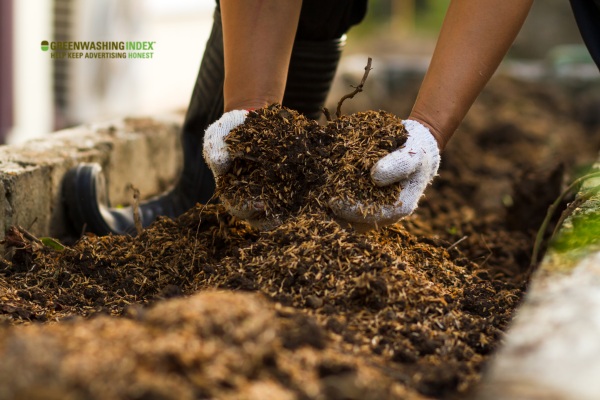
Ant Invasion – A sign of a dry pile
When I notice lots of ants scurrying in my compost heap, I know something is off. And that’s usually the humidity level. Ants love dry environments, and their presence usually indicates a parched pile.
While they’re not inherently damaging to your compost or garden—they help break down organic matter, after all—their presence tells me my compost isn’t decomposing at its best rate.
To remedy this situation:
- Start by giving your pile a good mix. This circulates more moisture throughout every layer.
- Wetting the material also helps increase the moisture content, encouraging other helpful decomposer organisms to return.
- Take care not to douse the compost heap; it simply needs to be as damp as a wrung-out sponge.
Housefly Woes – Infestation Leading to Disease Spread
Our next troublemaker is the common housefly. Sure enough, flies buzzing around my heaps don’t only annoy me but also risk spreading diseases into our homes due to their habits of feeding on various waste materials.
Their larvae—maggots—are exceptional decomposers, but they’re not worth risking human health over!
Here are the approaches I take against them:
- I always cover waste food with leaves or wood chips right after throwing them into my piles.
- Use fine mesh covers that allow enough air circulation while keeping flies out.
Spiders Bring a Bad Sign – How does desiccation harm your heap?
Spiders in my compost; let me know when it’s too dry again! These arachnids prefer dryer conditions, and a multitude of sightings means desiccation may be affecting my heap.
Dry compost bins interrupt the decomposing process, attract unwanted pests, and cause loss of nutrients.
Here’s how I treat an overly dry compost bin:
- Watering the heap lightly but regularly.
- Adding fresh green plant material, which naturally contains moisture.
- Mixing my compost periodically to ensure an even distribution of moisture.
Centipede Alert! Why worry about these fast crawlers?
At first glance, centipedes might not seem like a big deal in your compost pile. But they’re predators that feed on beneficial insects, messing up the balance of my microbial ecology. The result? A slowed decomposition process.
To control them:
- Maintain a balanced compost pile with adequate layers of browns (leaves or newspaper) and greens (plant clippings or kitchen waste).
- Regularly turn the pile to disrupt their hunting habits.
In dealing with these troublemakers in my compost bins, I’ve had to use pest control, but it all feeds back into sustainable gardening. After all, keeping these problematic creatures at bay means maintaining healthy soil!
Dealing with Larger Nuisance Critters
As much as we aim to harness the diligent work of compost bugs to sustain our gardens, it’s also crucial to make sure that larger nuisance critters like snakes, rats, possums, and raccoons don’t overrun our compost heaps.
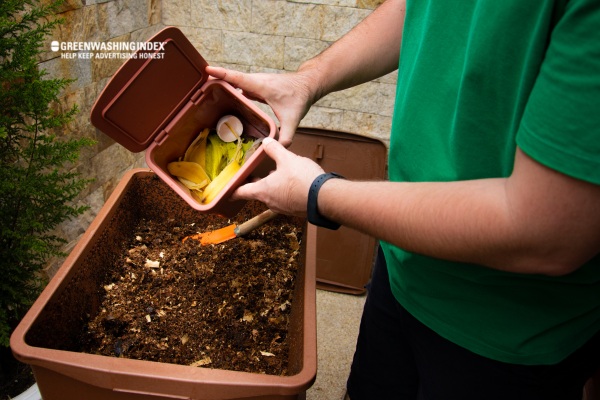
These voracious invaders can destroy our precious compost piles and can potentially pose a risk to our health or safety if not appropriately managed.
Here are some helpful tips for dealing with these larger critters:
- Fence Your Compost: Install a sturdy wire mesh fence around your compost pile. Make sure it’s buried at least 6 inches deep so that burrowing animals cannot gain access.
- Use a Compost Bin: A secure compost bin is another option that not only keeps out critters but also accelerates the decomposition process by providing a controlled environment where temperature and moisture can be regulated more effectively.
- Keep Compost Heap Moist: A moderately moist heap is less attractive to invaders compared to one that is too dry or too wet, minimizing the attraction for rodents who prefer drier areas.
- No Food Scraps: Avoid throwing raw food scraps, especially meat and dairy products, which could attract vermin.
- Turn Your Pile Frequently: Turning your compost pile helps speed up decomposition and lessen its attractiveness to wildlife.
- Natural Repellents: Essential oils such as peppermint or citronella can work as natural deterrents for many types of pests, including raccoons and mice.
Working with nature requires some vigilance on our part – being aware of the changes in soil health or sudden shifts in microbial ecology could provide early indications of larger critters’ presence, allowing us to maintain sustainable gardening practices effectively.
If your compost heaps seem to attract unwanted visitors continually, it might be necessary to seek professional help. They can tailor a customized solution to your unique situation, ensuring that your garden remains a safe and sustainable space for you and the beneficial decomposer organisms busy breaking down organic matter in your compost.
FAQs
What should I do if my compost has bad bugs?
If your compost pile is infested with bed bugs, don’t panic. Try to adjust the conditions, like moisturizing overly dry spots to drive ants away or covering your pile properly to control fly infestation.
How can I attract good bugs to my composter?
Attracting beneficial compost bugs is easy. Make sure your compost consists of a healthy mix of green and brown materials, and ensure it’s regularly turned and kept moist but not soaked.
How will I know if an insect is a friend or foe to my pile?
Knowing the good from the bad in terms of compost bugs often involves a bit of observation. Beneficial insects aid decomposition without causing noticeable damage, while troublesome ones may hinder decomposition or spread harmful bacteria.
What is the importance of bugs to a healthy compost pile?
Compost bugs play an essential role in breaking down organic material into nutrient-rich soil. They constitute an intricate part of the microbial ecology, ensuring efficient organic decomposition and sustained soil health.
Conclusion
In the grand scheme of sustainable gardening, understanding compost bugs and their roles is vital. The balance between good and bad bugs is delicate but crucial to maintaining soil health.
While pillbugs, beetles, red worms, soldier flies, slugs, snails, and millipedes play important roles in organic decomposition and microbial ecology processes, we should also be aware of common pests such as ants, houseflies, spiders, centipedes or larger critters. Though they pose certain challenges to your compost pile’s health and lifecycle, effective pest control in compost is achievable.

